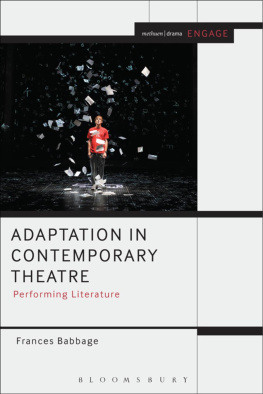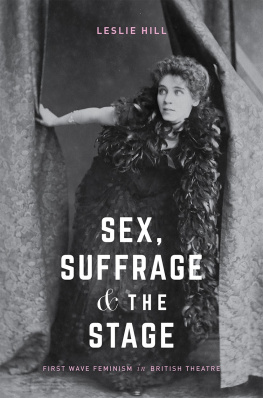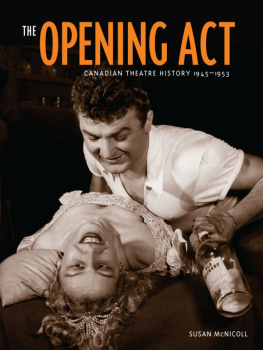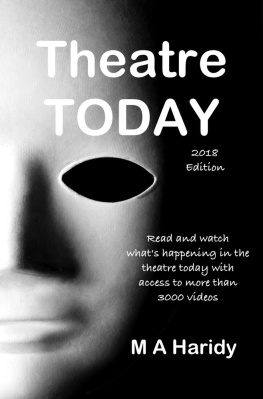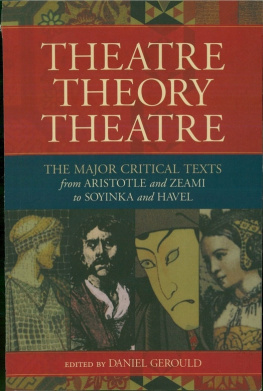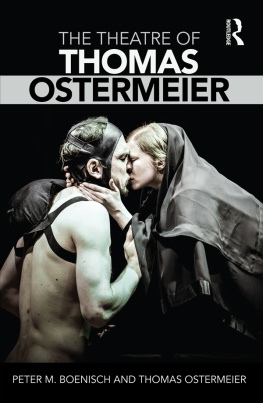Index
Page numbers in bold indicate figures and tables.
Aaltonen, Sirkku,
Abraham, Natalie,
Acco Festival for alternative Israeli theatre,
A Jia,
Amit-Kochavi, Hannah,
Anouilh, Jean, Antigone,
Arabic-to-Hebrew translation, The Impotents (Masarwy),
Acco Festival,
Arabic performance with Hebrew surtitles,
audience imposition of conflictual significance,
available translators,
Cameri Theatre reading,
conflict-related translations,
directed by author,
effects of ongoing conflict,
ex-military translators,
imposition of political significance,
Israeli-Palestinian conflict,
linguistic characterisation of dialogue,
literal translation,
multi-phased process,
play based on short story,
play choice, political nature of,
Tel Aviv University theatre studies,
theatre as a political tool,
translational decisions,
Artaud, Antonin,
Aufricht, Ernst,
Avon Foundation Writer centre, Shropshire,
Babel, Isaak, Marya,
Bailey, Mark,
Baker, Mona,
Baker, Tim, production of Threepenny Opera,
Balas, Shimon,
Bal, Mieke,
Bamborough, Karen,
Barker, Howard,
Bassnett, Susan,
on performability,
and Trivedi, Harish, Post-Colonial Translation,
Beckett, Samuel, Waiting for Godot,
Berliner Ensemble,
Berman, Antoine,
Bernhard, Thomas,
Blackdrop performance poetry events,
Blair, Rhonda,
Blakemore, Diana,
Blitzstein, Marc,
Blom, Eric,
Boeglin, Bruno,
Bogdanov, Michael, production of Brecht,
Bolt, Ranjit,
Bond, Edward,
Boswell, Lawrence,
Bourdieu, Pierre,
Bourne, Matthew,
Brault, Christophe,
and Dias, Jean-Paul,
Bray, Barbara, translation of Anouilhs Antigone,
at the National Theatre,
audience involvement,
Joe Fleischhacker,
Lehrstcke,
Mahogonny Songspiel,
On Chinese Acting,
performing his work,
problems with translation rights,
see also (Brecht)
British Grotowski Project, University of Kent,
actoraudience relationship,
basic requirements of translation,
complex assignment model,
depth and detail of translation,
distraction to hearing audience,
dramatic dialogue,
Ibsens Hedda Gabler,
interaction of translation/interpretation/performance,
interpreter: and theatre practitioner,
markers of plot/character/ relationships,
multi-modality of audiovisual communication,
preparation for assignment,
scene as unit of translation,
Shakespeares Richard III,
Sing Yer Heart Out for the Lads,
translation of theatrical text,
unnecessary dialogue,
visual elements,
British Theatre, translation work,
see also
British theatrical system, cultural imperialism,
audience preferences,
commercial imperative,
dangers of clarity and realism,
domestication of dialogue,
foreign drama marginalised,
linguistic/cultural specifity,
naturalistic style,
performability and marketability,
self-censorship,
stage translation,
Brown, Kenneth,
Brownlie, S.,
Bchner, Georg,
Bulgakov, Mikhail
Crimson Island,
Flight,
Caldern
El pintor de su deshonra,
translation of,
Canada
linguistic territories and minorities,
Quebec and Francophone identity,
see also ; Western Canada, bilingual drama
Castledine, Annie,
Channels project (National Theatre Studio),
Chefitz, Eric,
Chekhov, Anton
at the National Theatre,
translations of,
writing practice,
Chen Shizheng,
Chreau, Patrice,
Chernoff, John Miller,
Chikmatsu,
Chinese xiqu,
actorcharacteraudience relationships,
actor training,
adaptation,
embodied experience,
fundamental aesthetic,
Jingju,
kunqu,
zaju,
see also
Cobbe, Rosie,
Channels project (National Theatre Studio),
The Fence,
The Gate Theatre,
Janus, international cultural project,
Traverse Theatre, Edinburgh: audience response,
use of literal translations,
West Yorkshire Playhouse,
Writernet,
writer-to-writer involvement,
Connery, Sean,
Cottesloe studio theatre, National Theatre,
Education Department,
Cournoyer, Daniel,
Coward, Noel,
audience specific adaptations,
English-French translation,
linguistic duality,
original English text,
presentation at Ottawa festival,
regional differences in French dialogue,
rodeo background,
tour of Western Canada,
translation for francophone audience,
Cracknell, Carrie,
directing Mobile Thriller,
Craig, Ryan,
Croft, Giles,
Cronin, Michael,
Curry, Tim, as Macheath,
Czachowska, J., Gabriela Zapolska,
Daldry, Stephen,
Dalp, Jean Marc, French-Canadian drama,
Darin, Bobby,
Davies, Howard,
Davies, Norman,
the Deaf community,
see also
De Filippo, Eduardo,
Delgado, Maria, and Fancy, David,
De Marinis, M.,
Demtraki, Stavros,
Dias, Jean-Paul,
Din, Ayub Khan, Rafta Rafta,
Dingwaney, Anuradha,
the director (Pavis),
displacement of verbal text,
focus on sonority and rhythm,
knowingness of the actors,
marking the boundaries of silence,
metaphysical resonances,
non-mimetic live sound,
non-verbal elements of performance,
physicality of performance,
theatrical discourse/dramatic action,
translator as metteur en scne,
use of silence,
verbal/non-verbal signifying systems,
writing a performance text,
Dodgson, Elyse,
Dresher, Paul,
Drrenmatt, Friedrich,
Early, Michael,
Eddershaw, Margaret,
Edinburgh Festival Fringe (2004), production of Mobile Thriller,
Edis, Steven,
American Repertory Theatre (ART) production,
critical reception,
jingju basic training,
kunqu arias and performance skills,
original script,
rehearsal tool for student performers,
as Snow in Sweet Summer,
use of professional xiqu performer,
Western experimental music-theatre,
xiqu performers and techniques,
xiqu principles,
jingju performance techniques,
jingju vocal technique,
Judge Bao and the Case of Qin Xianglian,
playable translation of jingju performance convention,
preparatory physical training,
rehearsal script,
vowel sounds, Mandarin and English,
English language audiences, attitude to foreign plays (Hampton),
English theatre
Londons West End,
Royal Shakespeare Co.,
see also
play selection,
see also
Erdman, The Mandate and The Suicide,
Erskine, James,
Euripides, The Trojan Women, performed in Israel,
Eyre, Richard,
Fancy, David,
Farquhar, The Recruiting Officer,
Farr, David,
Fiennes, Ralph,
Fish, Stanley,
Fitzgerald, Susan,
Fort, Paul,
Fosse, Jon,
Franzon, Johan,
Frayn, Michael,
translation of Chekhov,
French contemporary theatre
actors must accommodate text,
and the British establishment,


